The Dell Chromebook 11 Touch Review
by Brandon Chester on May 7, 2015 8:00 AM EST- Posted in
- Laptops
- Chrome OS
- Chromebook
Web Performance
Due to the limitations of Chrome OS, we're mostly limited to browser benchmarks to characterize performance. It's a similar situation to mobile benchmarking, which I commonly describe as less than optimal. However, since essentially everything a user will do on a Chrome OS device is done through Chrome, it's actually a fairly good indication of the performance they'll see on a given device.
Like the Toshiba Chromebook 2, the Dell Chromebook 11 being reviewed uses Intel's Celeron N2840. Unlike Intel's more expensive Celeron parts which use their Haswell architecture, N2840 uses Silvermont cores much like Intel's Atom parts in the Bay Trail line. Because of this, users should expect performance closer to that of higher end ARM chips and Intel Atom SoCs than that of Intel's Haswell based Celeron parts.
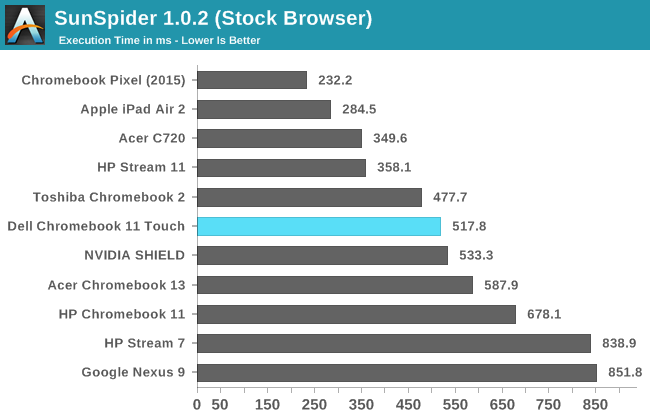
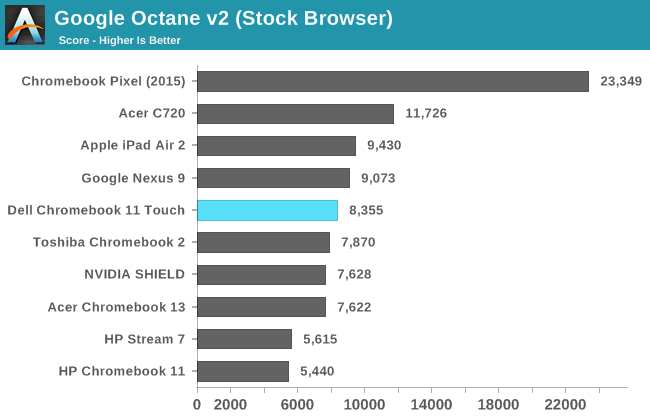
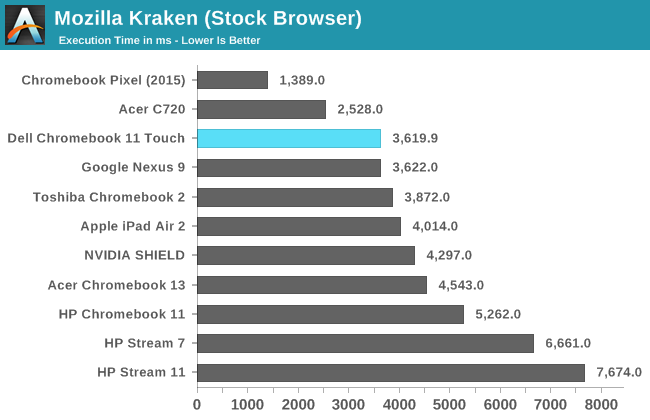
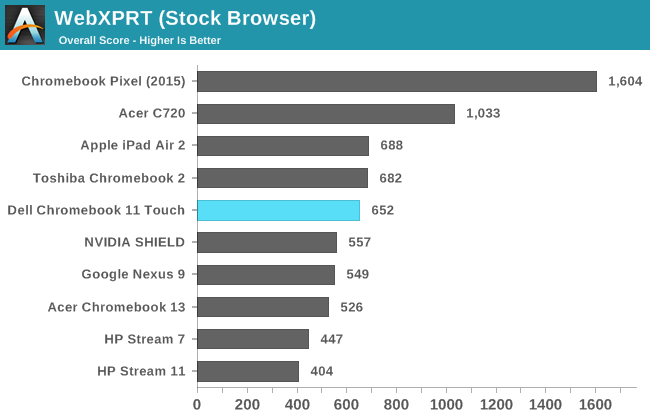
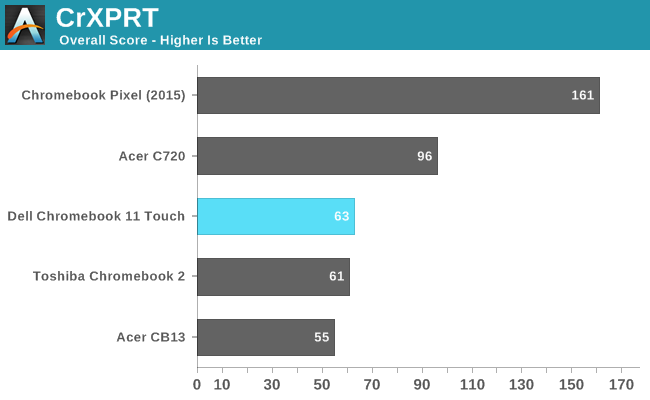
In all of our benchmarks, the Dell Chromebook 11 gets roughly the same results as the Toshiba Chromebook 2. There are some minor differences which can be attributed to variance in scores between tests, as well as updates that have been made to Chrome OS since previous reviews. When using the Dell Chromebook 11 it never seemed to struggle, and I think that users will have all the speed they need to do their work on the web even if the CPU doesn't offer class leading performance.
WiFi Performance
Since Chromebooks are devices that are primarily used to browse the web, it's important to have good WiFi performance. Most inexpensive Chromebooks opt for 802.11n, and sometimes don't even include support for the 5GHz band. Because the Dell Chromebook 11 is more of a mid range Chromebook, it includes support for dual spatial stream 802.11ac which is pretty much as good as it gets for laptop WiFi, with the exception of a few 3x3 devices that are on the market.
While there's no way to test WiFi performance in Chrome OS, it can be accomplished via other means with the use of Linux and iPerf. I'm hoping to eventually bring our laptop WiFi performance test from Windows to Linux in order to get TCP results that are comparable to those in our standard laptop reviews, but for now I've just put the Dell Chromebook 11 through the UDP performance test that we use in mobile reviews.
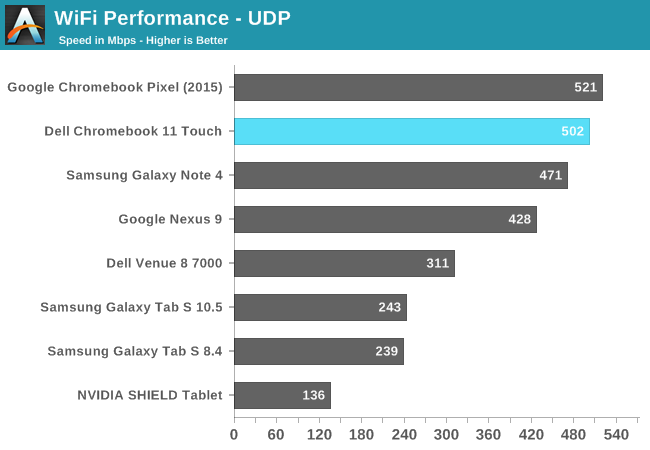
With a maximum speed of 502Mbps, the Dell Chromebook 11 is beaten only by the Chromebook Pixel. I wish I had more Chromebook data points here, but this is a test that I introduced for our Chromebook reviews and this is only my second review of one. Regardless, I don't suspect that users will have any complaints about the WiFi performance on the Dell Chromebook 11.










46 Comments
View All Comments
Refuge - Monday, May 11, 2015 - link
I just can't take you seriously...Lord of the Bored - Friday, May 8, 2015 - link
A. Yes, Chromebooks can have a more conventional version of Lunix installed on them.B. The high cost for the amount of computer you're getting is because this one's "ruggedized." If you want the most bang for your buck, you don't get an armored computer. But if you want a computer that will take a licking and keep on ticking, you pay the premium.
nandnandnand - Thursday, May 7, 2015 - link
Is that the "Professor" on screen?webdoctors - Thursday, May 7, 2015 - link
This key paragraph should be in bold and giant font:I'm honestly very disappointed with the Dell Chromebook 11's display. I had thought the industry had moved past TN displays, with even the $99 HP Stream 7 sporting an IPS panel. With poor viewing angles, a low resolution of 1366x768, and poor color reproduction, the display on the Dell Chromebook 11 really has no redeeming values. It's especially disappointing when compared to the equivalently priced Toshiba Chromebook 2 which does very well in all of our tests and has a much higher resolution of 1920x1080 on a slightly larger 13.3" panel.
I have the Toshiba Chromebook, and the light weight and amazing screen really make it standout.
SM123456 - Thursday, May 7, 2015 - link
The $99 HP Stream 7 has a 7" screen limited RAM and a much slower processor though, plus if you want, there are Chromebooks with 1080P IPS screens if you want. The 720p 1366x768 screen isn't particularly noticeable, but the TN display with its narrow viewing angles and washed out display is. Still, a lot of people are OK with that and prefer not to pay for a better screen. Sill I guess it is each to his/her own.sorten - Thursday, May 7, 2015 - link
A web browsing machine with an 11" screen with 13x7 resolution. So ... what distinguishes this from the netbook of years past?jabber - Friday, May 8, 2015 - link
Well netbooks had a smaller 1024x600 res screen so there is that.Plus netbooks were really slow.
timgonzales - Friday, May 8, 2015 - link
I had the non-touch, 2GB version of this Chromebook from Amazon for $189.99 (before tax) and had to return it because the display was god awful. My sister-in-law recently bought an HP Stream 11 and, surprisingly, it has a significantly better screen in comparison.zodiacfml - Friday, May 8, 2015 - link
This is just perfect for schools which explains most of the design.You don't know how invaluable the Wi-Fi AC is in a dense classroom. Dual stream adds icing on the cake. 30 of the same device in a classroom should not be a problem for a single Wi-Fi AC router or access point.
The display is pathetic though. This should drop in price around $200 - $250 where you could find Windows 8.1 laptops without the AC standard.
jabber - Friday, May 8, 2015 - link
1366x768 is actually fine on a 11" screen. Anything larger and it's unacceptable.However, if using that res at 11" there is no reason not to spend another $5 on a calibrated IPS spec panel to at least make it look better.
However, I would accept a 1440/1600x900 as a budget 11" option.